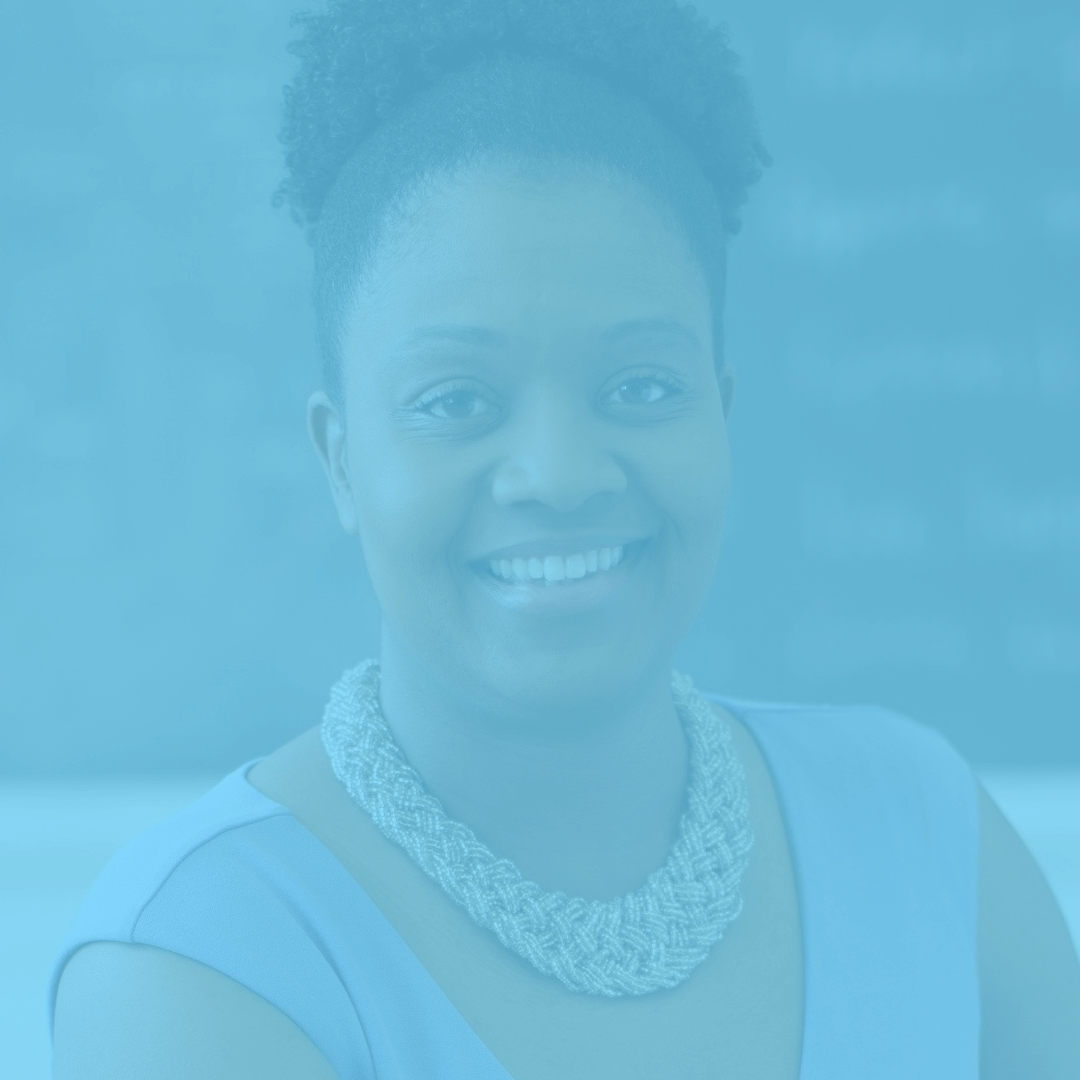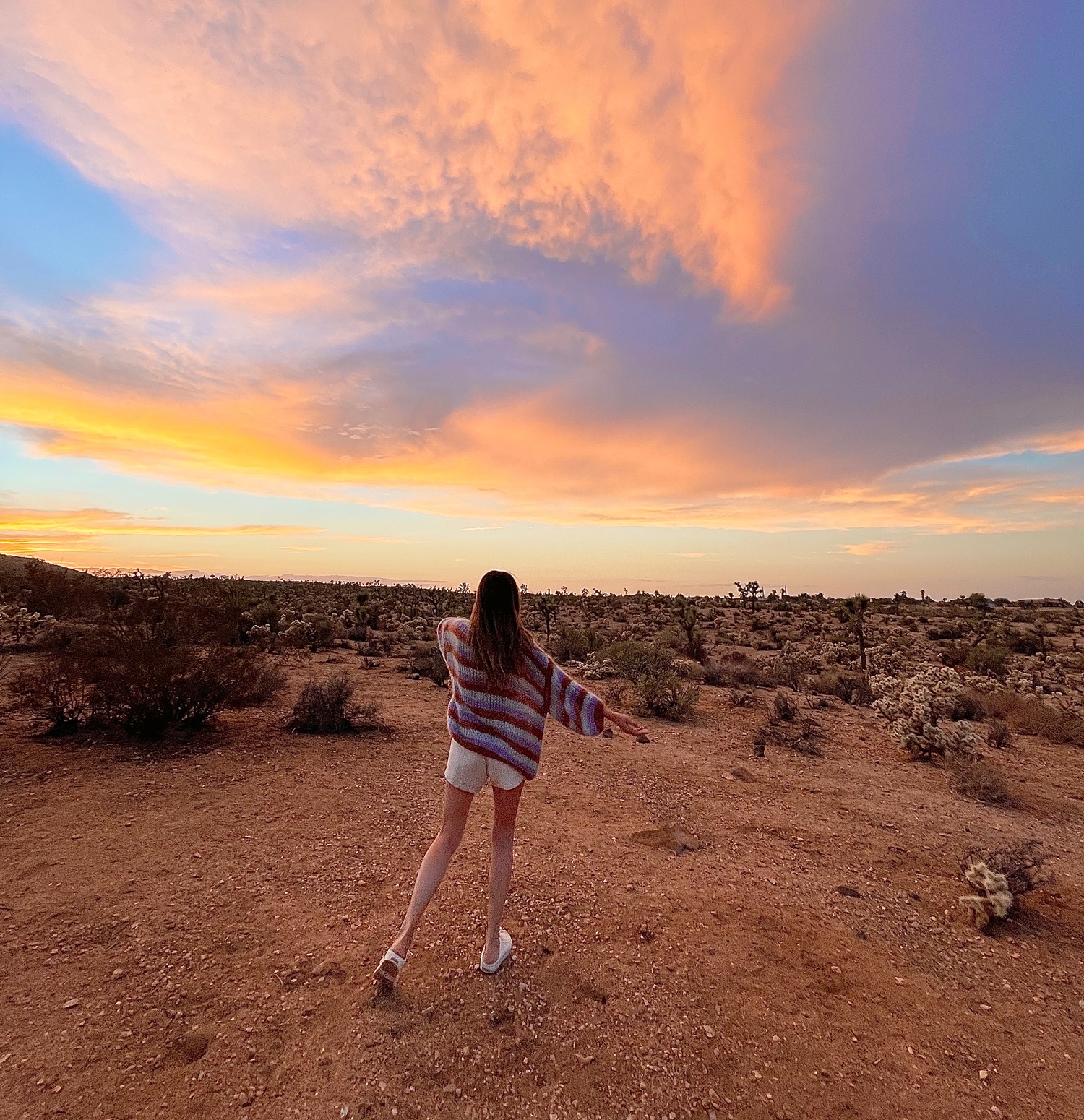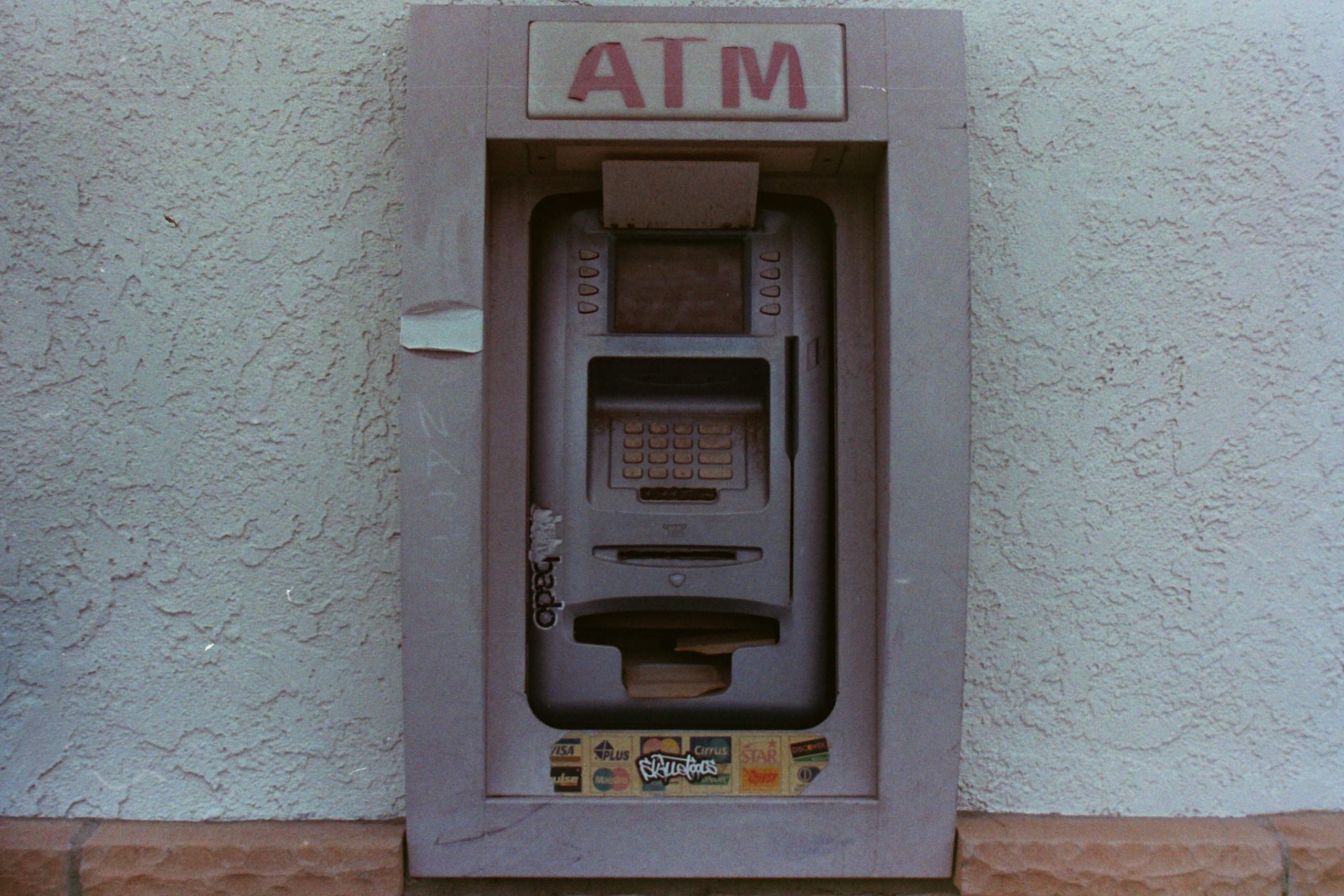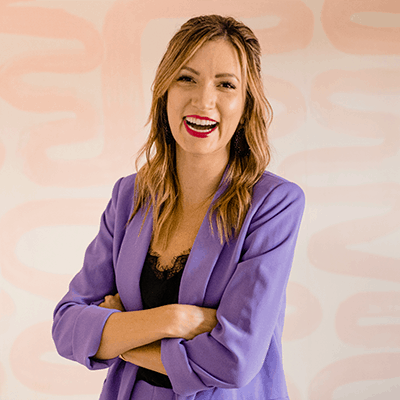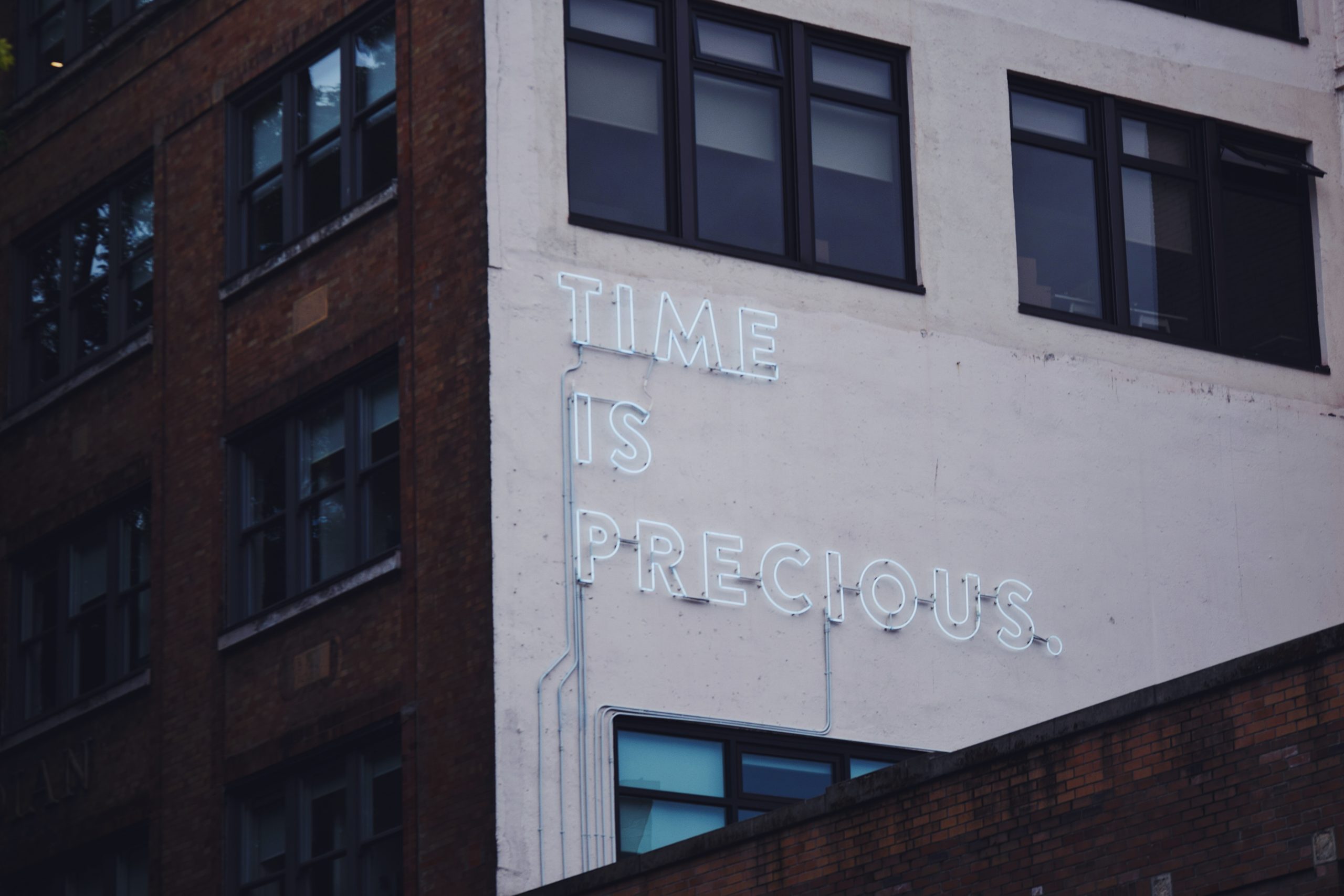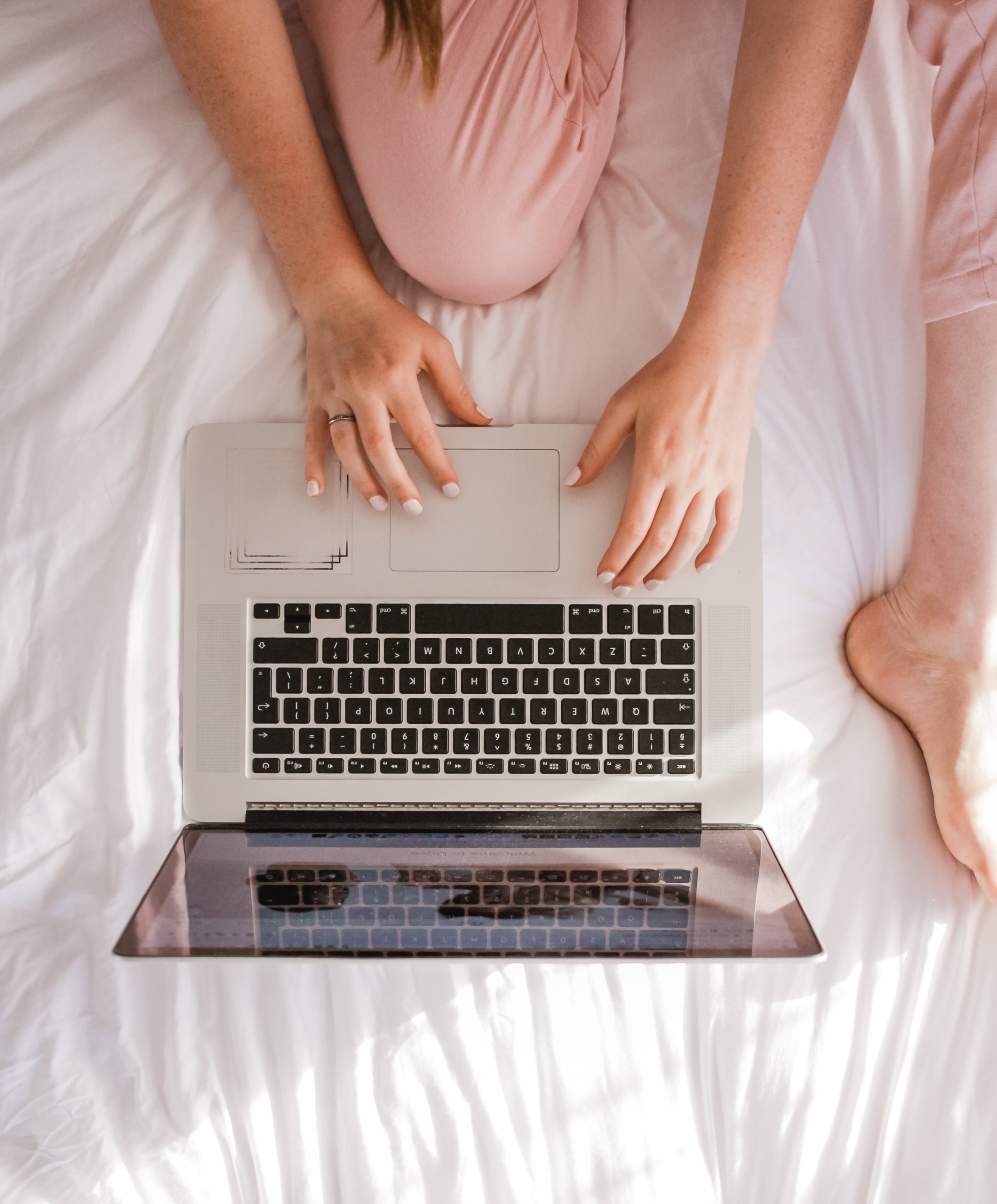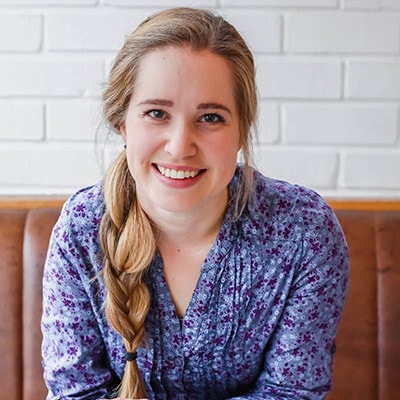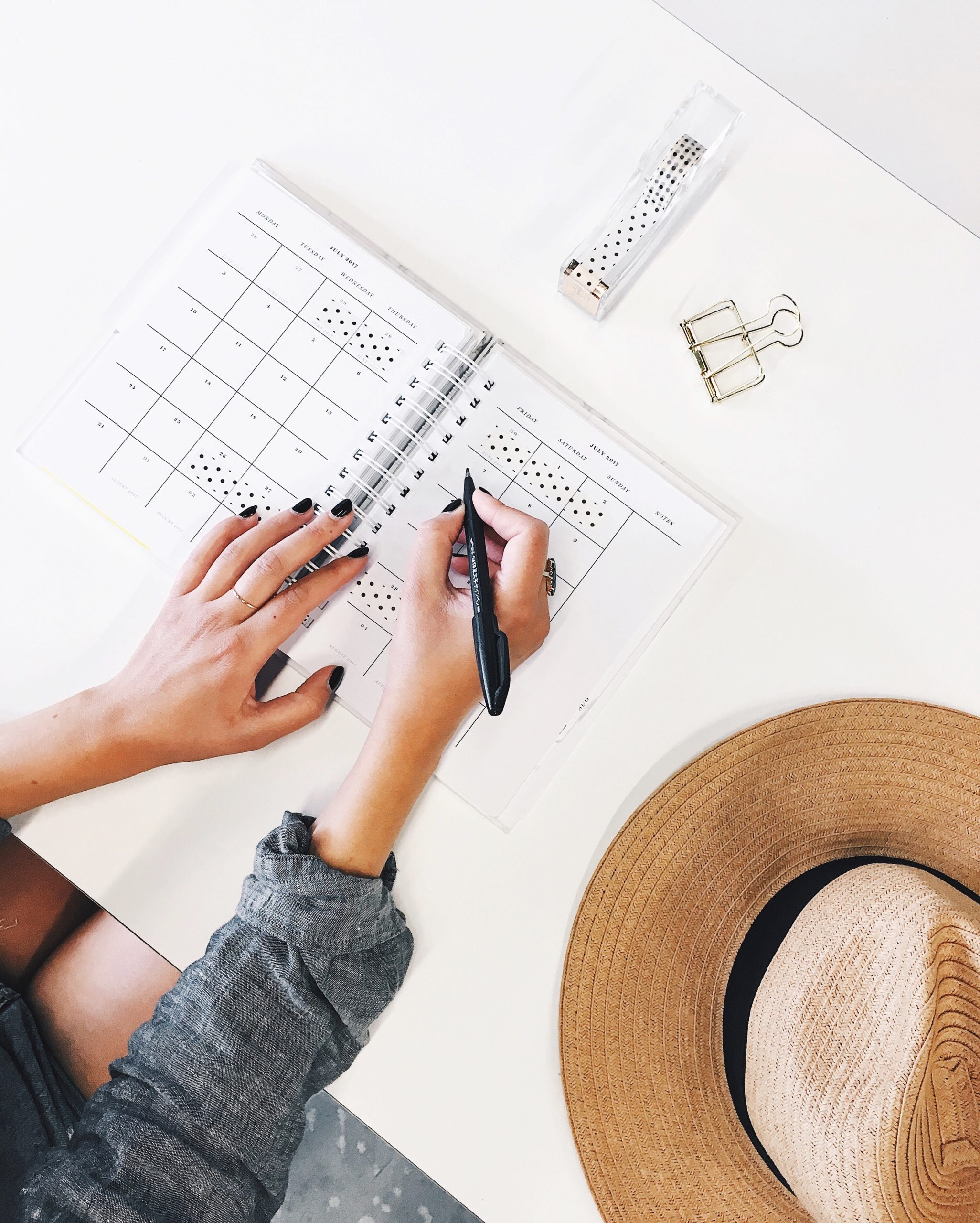As a recovering “nice girl,” I’m constantly drawn to people living out their truest selves and sharing their unedited souls with the world. And that’s exactly what today’s guest Leesa Renee Hall is so freaking good at.
Author of 7 (going on 8!) books, tech guru, and social historian, Leesa is unapologetically herself and extremely tuned in with herself internally — something I’m constantly trying to improve (as I think we all are, right?).
Last year, Leesa spent 365 days (yup, even weekends) waking up at 4:30 am to write, which resulted in a staggering half a million words by the time the year was up (say whaaaat?!).
At her core, she’s a huge proponent of something called “expressive writing” in order to develop a holistic understanding of one’s self — even if that means shedding your people-pleasing ways.
In this episode, Leesa takes us on a journey of discovering our highest selves. From understanding our habits and the patterns of our emotions through journaling, let’s just say I left the conversation SO motivated to uncover more.
We also dig really deep, uncovering cultural biases, the importance of ancestral knowledge, and what understanding our cultural triggers can teach us about ourselves (especially in the current climate of our country). Goosebumps, guys…goosebumps.
If you’re craving a deeper knowledge of yourself and want to learn more about the power of expressive writing, I know you’re gonna loooove this conversation.
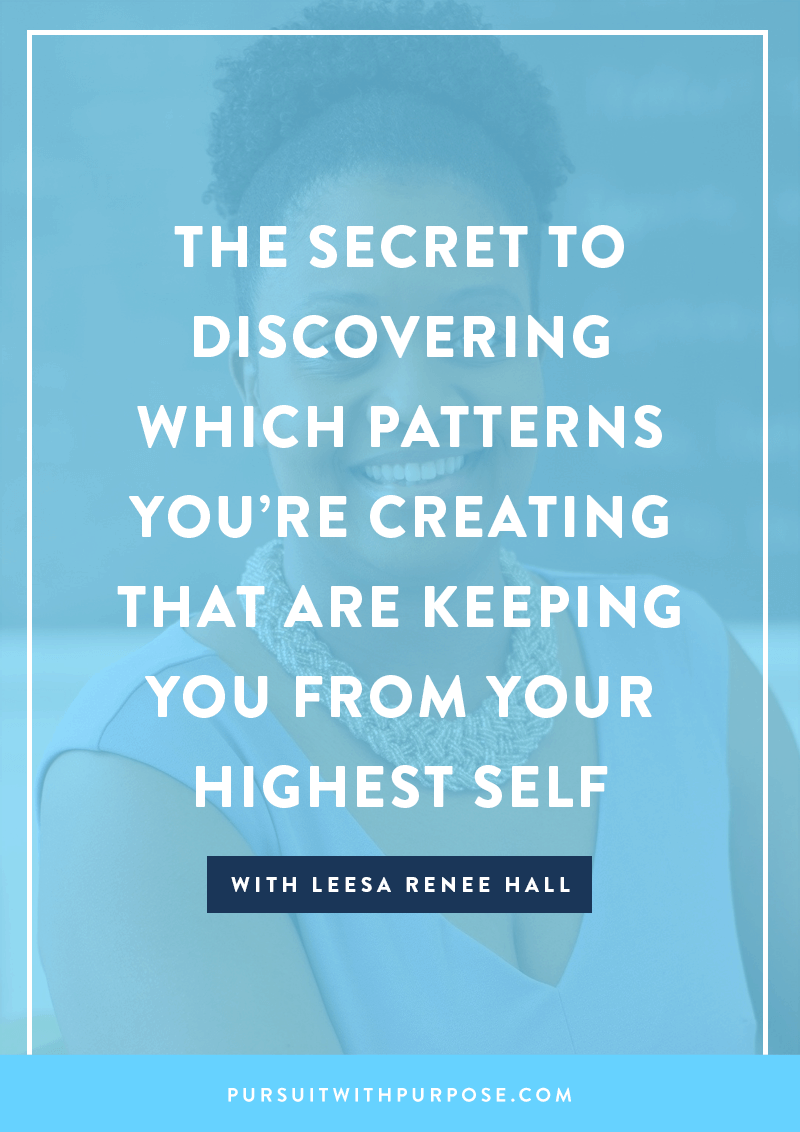
Check out the episode below:
In this episode, you’ll hear about things like…
- What expressive writing is and how it can unlock emotions and unconscious biases.
- Why presenting yourself as the “good girl” (or person) is blocking you from discovering your highest truth.
- How to use your unique personality, triggers, and traits to develop habits, and communicate your needs to others.
- How knowing your lineage can heal not only yourself, but future generations.
- How to use social media in a way that doesn’t isolate your ability to create, debate, and have tough conversations with others (and yourself).
Some Questions I ask Leesa…
- What do our listeners stand to gain from developing their own expressive writing practice?
- What do we do with the different emotions that come up in our life?
- There’s something you wrote on your website that I thought was very powerful. You said, “Before you can have the hard conversations around systemic oppression, you first need to break down the hard, hidden, and unresolved issues within yourself.” What do you mean by that?
Links from the interview:
- Awaken To Your Why (Core Values Writing Exercise)
- Leesa’s Website
- Leesa’s Books
- Leesa on Patreon
- Sleep With Me Podcast
- Bob Ross – The Joy of Painting
- Family Search
What do you think?
I’d love to hear your thoughts on this episode. Do you have a regular writing or journaling practice? What have you learned about yourself through having one?
Here’s how to subscribe + review
Want to be the first to know when new episodes are released? Click here to subscribe in iTunes!
Also, podcast reviews are pretty darn important to iTunes and the more reviews we receive, the more likely we’ll be able to get this podcast and message in front of more people (something about iTunes algorithms?). I’d be extremely grateful if you left a review right here letting me know your favorite part of this episode.
#PursuitWithPurpose
Loving the podcast? I encourage you to use the hashtag #PursuitWithPurpose to show our PWP tribe how you live your purpose everyday. Plus, you’ll get to sift through the hashtag to find other business owners who care about community and connectedness over competition and comparison. And I’ll be reposting some of my favorite images and stories, too. 🙂
Thank you for listening!
Transcript
Read the Interview Transcription HereHey, every day world changers. So today’s guest, Leesa Renee Hall, is quite literally one of my favorite people. I really mean that because she’s the kind of woman who is unapologetically herself, who says what’s on her mind and her heart even if she knows that some people may get rubbed the wrong way. As a recovering nice girl myself, this is something that I’ve been working on bringing into my life more now too. I’m just so inspired by how Leesa shows up in the world. She speaks her mind and yet she’s able to do it in a way that is loving and genuine. Now I know that you’re going to be moved by her words in this interview in the same way that I am. We dig are really deep here. Now in this conversation, we talk about a unique writing practice that Leesa teaches, what she says is one of the best things she’s ever done for developing more self-awareness, discovering who she truly is deep down, and embodying more of herself in everything she does, instead of being a watered down nice girl version of her personality. Now Leesa knows a thing or two about writing in vulnerability because she is the author of seven, almost eight books. And more recently, has turned her attention to writing about the intersection of race, spirituality and leadership, some really important stuff. Now in this discussion, she’ll help you dissect your own identity in a really meaningful way so that you can truly see who it is you’re being in order to become who you’re really meant to be. This conversation was very special and beautiful to me, and I hope you love it as much as I did. Let’s dive in.
Melyssa Griffin: Hey, Leesa. Welcome to the show.
Leesa Renee Hall: Thank you for having me, Melyssa.
Melyssa Griffin: So thrilled to chat with you, Leesa. So the first thing that I want to talk about is, something that you I feel have introduced to the online world in a really big way, which is expressive writing and especially using expressive writing to talk about things like race and identity and spirituality. So before we dig into this amazing massive topic, can you tell us a little bit about what expressive writing is?
Leesa Renee Hall: Yeah. I didn’t know that expressive writing was a thing when I started to write. What I did as—I was writing my first work of fiction, and so I started writing a chapter a day. And then it was on 60th morning when I woke up at 4:30 AM to write and I said, “I’ve got a…”—I was feeling some angst over a professional setback. So I said, “Well, let me just write about this. Let me just write about this.” And I did. And then the next morning, I wrote again about some feelings I had, and then I wrote again after that. Yeah, so I was writing uncensored, unfiltered. I didn’t edit myself. I just was like—I do keyboard and screen because I can get my ideas out faster, so I just was like typing… And that’s when I came across Dr. James Pennebaker’s work. He’s a researcher who has looked at the power of writing to dig deep into your shadow, to get out those emotions. That’s when I realized oh, it’s a thing. And so he calls it expressive writing. So the art of expressive writing is to write uncensored, unfiltered, and write everything that’s coming to mind. You’re not supposed to look over your work. You’re not supposed to edit it. You’re not supposed to look back and say oh let me—you’re not writing for an audience. You’re simply writing to get the emotions out.
Melyssa Griffin: And what does somebody stand to gain from doing that practice?
Leesa Renee Hall: So what they can gain is a better understanding of themselves. Many of my patrons in my exclusive community, they use the expressive writing prompts I developed, to work through and unpack their unconscious biases, to unpack whiteness, to ask questions around skin color and their upbringing. So oftentimes what we do is, we suppress those negative emotions, because on this side of the world, in our tradition, growing up in our culture, we’re told that the negative stuff is like don’t think about that if you’re religious, you’re told that you know that if you think bad thoughts, then God can’t bless you. And so we’re conditioned to suppress the bad and the negative, but when we can write through that, then we awaken ourselves to what’s hidden. What’s hidden is often in that chaotic space. So when we can finally address it, we can come out on the other side, understanding better about our own personality, but also how not to repeat the same mistakes again and again and again because we finally addressed it.
Melyssa Griffin: I love that. There’s something—I guess I’ve kind of been doing this, I would say more off and on over the past year, but writing a lot of whatever comes to mind, kind of stream of consciousness, but really getting out things. What I noticed the biggest thing for me was, seeing the patterns that I create in my life, because if I just think about them, then I’ll see them every once in a while but I won’t see them as a pattern. And then when I write about them, it’s like oh my gosh, I wrote about the same thing four times in the past two weeks. Have you noticed that same thing with your writing too?
Leesa Renee Hall: I have. I remember I was—one of my friends on Facebook had posted a question saying, she said, “Who was your first kiss with? Do you know their name?” And so a lot of people started answering. So I thought it about—I said, “Oh my goodness, I haven’t thought about him in like forever.
Our first kiss was when I was 13 years old. So then I started thinking about okay, who was my first boyfriend. And so I started to think about that. I pulled up yearbooks to see or to remind myself what he looked like. And then I started to obsess about these memories. And so I started writing through it because I’m like why am I obsessing about my very first boyfriend from high school. I haven’t had any contact with him in 30 years, so what is going on here? As I continued writing, it took me like two weeks, two weeks to finally get through what it was. When I finally identified why I was obsessing about this, is because there was an unhealed—there’s something unhealed that had happened. And so when I finally—and so when we find that we’re repeating ourselves in our writing, it’s because we’re not being true to ourselves. It’s our soul trying to knock on the door saying, “Wait, wait, wait. You didn’t go deep enough. You didn’t open the door and go into the room further enough.” Further enough, is that such a…? Okay, we will say it as further enough.
Melyssa Griffin: I like it.
Leesa Renee Hall: Thank you. And so when we find that we’re writing and writing and it’s not going away, it’s because we need to go deeper.
Melyssa Griffin: Wow, that’s really powerful.
Leesa Renee Hall: Yeah. And then when I finally went deeper, that’s when I realized oh, there’s an unhealed memory, an unhealed issue that happened between us. And then it was—and it’s scary. Who wants to go down a dark alley? Nobody wants to do that. That’s what these negative emotions are. It’s like going down that dark alley with no lights and you don’t know what’s down there, you don’t know what’s on the other side, but we have to get through there because maybe that’s the only way to get to where we’re going. And it’s the same thing with our emotions. It’s the only way we can heal and come out a better person so that we can do as you said, spot those patterns and break them.
Melyssa Griffin: Wow, that’s powerful. So when we’re doing this writing and we’re bringing up all of this stuff that maybe a lot of us have spent a lifetime suppressing and pushing away because it’s scary, what do we do with it once we discover that it’s there?
Leesa Renee Hall: So the beauty, the beauty of this is that there are so many different options. First thing first is that you don’t necessarily have to share what you’ve written with the outside world. So when I got up every morning at 4:30 AM to write—again, I started writing to get a fictional book out of my head, but then it turned into writing about Leesa, writing about my 15 years working in the tech field, which is a white male dominated field as a black woman with a history degree. That doesn’t usually happen. So I wrote about that. I wrote about all these different emotions. A lot of what I’ve written, Melyssa, will never see the light of day because it was my healing. It was my chance to heal. I found that with some of my patrons in my exclusive community, when they’ve used the expressive writing prompts that have come out of my own year of writing, some of them have used what they’ve written, they’ve used that to express themselves through painting. I have a patron who is inspired to dance and create. She was a dancer when she was younger, so now she sees this connection between exploring those emotions and dancing. And so when we heal—and for some of us, it might be having better relationships. There’s a couple in my exclusive community who have conversations around the questions that I deliver. It’s made their relationship stronger. So maybe it’s something creative that you create out of this chaos or maybe it’s just showing up more full and more whole in your relationships.
Melyssa Griffin: Yeah, that seems like a big one. I’m reading a book right now called “Letting Go”. Have you heard of it?
Leesa Renee Hall: I’ve heard of it, yes.
Melyssa Griffin: Yeah. It’s similar, where it’s almost like our natural response to pain and trauma is to just like push it down, get rid of it, this is not wanted here. What he’s saying and what you’re saying in your expressive writing is, bring all of it up, feel it, let it be there. And then it goes away and then it can translate it into other things and making it beautiful. I think that’s so important. So I want to hear about what you did, which was you did this for 365 days. Every single day, you wrote half a million words in total, which for context for any listening who’s like I don’t know how much that is, that is 1000 pages, single spaced. That’s crazy.
Leesa Renee Hall: Oh, thank you. I didn’t even know.
Melyssa Griffin: I looked it today, I was like how much is that because that sounds like a ton of words. That’s incredible. Why did you do that?
Leesa Renee Hall: So when I started to write the fictional book as I said before, and then it turned into healing and then activism, but it was—the reason why I did this is to set a better habit around my writing. In fact, I mean that was a secondary thing, but it was really to find who Leesa is. I didn’t know that who Leesa is, is a writer. I’m talking about myself in the third person, sounds weird.
Melyssa Griffin: Sounds very like divine and cool, so run with it.
Leesa Renee Hall: As I continued to write, my writings got better. Even though I was writing uncensored, unfiltered, I found that by dumping out all that stuff first thing in the morning at 4:30 AM, it allowed me to show up more fully when I did write for eyes to read. So this is what Julia Cameron, in her book called “The Artist’s Way”, she calls this the morning pages, where she encourages you to get up really early in the morning and dump out all the crap in your head. That way, again, you show up more fully throughout the day. So it was to set a new habit around writing. I mean I have seven books and I just came out with the eighth one. Here it is, proof copy right here.
Melyssa Griffin: It’s not out yet?
Leesa Renee Hall: It’s not out yet. So this is a print copy.
Melyssa Griffin: I like the color.
Leesa Renee Hall: Yeah, very simple. Thank you. Thank you. Because the way I write before would be, I’d sit down for three weeks, hammer through a bunch of content, and wouldn’t write again for about three years. So I thought it was trying to develop a new habit around writing, but really what it was, was to find Leesa’s identity. And so when I kept writing and when I finally crossed the one year mark, half a million words, I sat back and I said, “Woah, I’m actually a writer. I’m a writer. I’m a writer.”
Melyssa Griffin: So before this, you had written several books, right?
Leesa Renee Hall: Yes.
Melyssa Griffin: But you hadn’t considered yourself a writer by that point?
Leesa Renee Hall: I had not. All my books had something to do with some technology tool and making money. So it was podcasting for profit, how to make money using a podcast. Second book was how to make money using virtual events, virtual summits. The third book was an e-book, how to make money speaking on virtual stage. Then I did one for Christian entrepreneurs because I thought I was going to become an evangelist. And this is how to make money fixing your mindset. And then the companion devotional, how to make money again using your mindset, using a devotional, and how to make money while networking, and then how to make money by talking about money. So those were the seven books. That’s what I wrote about. It was always about how to use some tool to grow your business. And so I didn’t see that as a function of writing, I saw that as a function of getting more consulting gigs, getting more speaking gigs. I saw it as a way to open the doors, but instead, each of my books closed them. It was funny. Each of my books closed the door, because as soon as it was published, it was like nobody was interested in hiring Leesa for anything. And so I never thought I was a writer. I just thought I was a great consultant who can write a companion book to help open doors and get more deals.
Melyssa Griffin: It sounds to me like before you were a writer in the sense that you’re creating tools and sharing strategies, and through this practice of everyday expressive writing, you became a writer of truth, of digging deeper into those things that are true for you in the world. Not just tools, but more of just identity.
Leesa Renee Hall: Yes, it was about exploring my identity, but it was also giving myself permission to explore myself and position my truth in front of others. It was easy for me to say—it was easy for me to stand behind words that said, “Here is the best way to do this so you earn money.” What was harder was removing that out of the picture and standing behind Leesa, and standing behind my truth, and presenting that to the world. I could present the tools to the world, but I had a hard time presenting my truth.
Melyssa Griffin: Wow. I got goosebumps when you said that. I feel very similar too, actually. I’ve spent the past few years creating programs and a lot of content around the tools of growing a business and how do you do that. And then I had this similar shift of feeling like I want to go deeper and I want to share more of my truth. I also want to help people with the non-tangible tactical side, but more of like helping them uncover their truth too, which it sounds like you’re on a similar path as well. That’s really interesting. I didn’t know that about you.
Leesa Renee Hall: Let me just add. I think one of the things that we have to recognize when we’re sharing our truth is that we have to let go of the need to be seen as good. And so some people believe they’re sharing their truth when they put there about pages together, when they show up in videos. They believe this is my truth, but they’re still presenting themselves as a good girl. And so part of what the year of writing did for me, it helped me realize that I’m neither hero nor am I a villain, that the way I show up in my truth isn’t so that you think I’m good, but that you can see the whole of my humanity. That’s the distinction we have to make. If our truth is just meant to make us appear good, then we’re not presenting our truth. We have to be willing to be anti-hero in our own narrative.
Melyssa Griffin: Oh wow. That’s powerful. I love that. I’ve seen that show up in my life too, where I felt like I’m being vulnerable and I’m sharing myself. And then I realized that deep down, there was a deep need for approval and a deep need for like I will be vulnerable but to the extent that people will still like me and appreciate it. Now I’m starting to dig deeper into that. Really my word, I was telling someone yesterday, my coach, that my word now is unapologetic. I want to be able to embody what I know should be true regardless of if people like it or not.
Leesa Renee Hall: Yes. It’s a hard place to get to,
Melyssa Griffin: Yeah, it’s not easy. It’s really like you’ve got to approve of yourself and then it doesn’t matter if other people approve of you. Getting to that place of like I approve of all this, it’s a lot of work. It’s hard. So how did you stick with writing every single day? You said that you woke up at 4:30 in the morning, which is very early. How did you do that?
Leesa Renee Hall: So I will say it was hard. They say it takes 21 days to create a habit. I think it took me a whole year.
Melyssa Griffin: Wow. That’s honestly encouraging for me to hear.
Leesa Renee Hall: It was so hard, Melyssa. On the Myers-Briggs scale, I am INFP. And so that’s the introvert, feeling, and perception (INFP). So people hear me and talk about my year of writing where I work up at 4:30 AM every morning that they think I’m an INFJ (introvert, feeling, judging). INFJ loves routines. They’re the ones with the journals that they open up and they’ve got the markers. The P in my Myers-Briggs profile betrays me every time, because that means I love the spontaneity. So in order for me to stay on this schedule, I had to have an element of spontaneity. That was the only way I was able to hang onto that habit. The way I kept my writing spontaneous is even though I woke up at 4:30 AM every morning, even on the weekends, even during the summer months—oh, the summer months was hard. It was so hard. But even during the summer months, that when I woke up each morning, I didn’t know what I was going to write until I sat down at my desk. And so that’s how I kept the spontaneity. Now again, I didn’t know that I was doing a thing, I just knew that I liked the surprise of opening up the computer and then saying “oh this is what I’m writing”. Even when I was writing every chapter a day, I didn’t start with chapter one and then go to chapter three and then chapter four. I started with chapter fifteen and then I opened the outline, I’m feeling like chapter seven today, and then the next morning, I’m feeling like chapter thirty. So by mixing spontaneity, I was able to stay committed to the habit.
Melyssa Griffin: I like that you formed it around your own personality instead of feeling guilty about the fact that maybe you don’t want to go in chronological order. I think we make ourselves feel guilty sometimes for doing things our own way. I like that you adapted it to how you knew that you functioned and what would be good for you. That’s awesome. For people who want to create their own expressive writing habit or maybe even do it every day like you did, would you have any suggestions or process that they should follow to do it successfully?
Leesa Renee Hall: Yeah, I get that question quite a bit. I know that my process may not work for everyone. The reason why early mornings work in terms of developing an expressive writing habit, is that it’s the one period of the day where you will not be interrupted. I can promise you there’s nobody in your neighborhood getting up that early in the morning. I can promise you, except for maybe the birds. There’s such beauty at that time in the morning because everything is so silent. It’s in that silence that we can hear the voice of the divine and our soul more clearly. And so whether it’s 4:30, 5 o’clock, 5:30, I promise you if you can get up at least 90 minutes earlier than you normally do—and some people say well I working nights, well it’s the same thing. Adjust as you can, but if you can get up at least 90 minutes before you normally do and commit to a process of writing, that will be the first step in creating a new habit, changing your life, and taking control of your self-care. I can promise you.
Melyssa Griffin: I’m going to try that. I’m going to try that tomorrow. 90 minutes early, okay. That’s like 5:30. That’s freeing to hear that actually. To hear that it took you a year to really feel good about creating that habit, to feel like you had created a habit. I think it’s easy to look at someone like you and be like oh she’s a writer, she wrote seven books. It’s in her blood. Good to know that this is not easy for you, is very freeing I think. A nitty gritty question, do you go to bed earlier to wake up so much earlier?
Leesa Renee Hall: Excellent question. Yes, I do. There’s so much I’ve had to give up. Well actually, let me reframe, there are different choices that I’ve had to make in order for me to get up at 4:30 AM. I need seven hours of sleep a night, which means I need to be asleep by 9:30. So that would be the seven hours. And so that means—I actually start preparing for bed at 2 PM the previous morning—that same day, the 2 PM that afternoon is when I start preparing for bed. What I do is if I consume caffeine, that would be the last—that would be my cutoff time. That way the caffeine can work its way through my system. Then around 7:30, I start going through the routine of getting prepared for bed. I’ll take a shower. I’ll fill up my diffuser with my essential oils. I will lay out clothes the next morning to head out to the gym, because the last thing I want to do first thing in the morning is scramble and to pack my gym bag. So I do everything from the night before. And then I shut off—I use an app, so that shuts off all my access to different websites, because I still need the device in my room in order to wake up, but it forces me not to go on websites and scroll and tap. And then I open a book around 8:30, start reading. And then by about 9:15, I start feeling drowsy. I also listen to an app—sorry, a podcast. It’s called “Sleep with Me”, where the guy tells really boring stories.
Melyssa Griffin: Oh, I’ve heard of this stuff.
Leesa Renee Hall: He’s amazing.
Melyssa Griffin: No way, wow. I want to try this.
Leesa Renee Hall: Yeah, Sleep with Me podcast. His name is Scoots and he tells really boring stories. They’re so boring, it’s hard to follow. And then because of that—like one time, he was trying to guess—he was looking at the wall of a hotel he was staying at. He was wondering whether the color of the wall was beige, off beige, tan, light brown. It was just like…
Melyssa Griffin: And it just puts you to sleep because it’s so boring. What a genius concept for a podcast. I love that.
Leesa Renee Hall: Yeah. So between him and Joy of Painting, what was his name? The white dude with the big afro. You saw the show on… Ross, Bob Ross I think.
Melyssa Griffin: Yes, Bob Ross.
Leesa Renee Hall: Yeah, between Scoots and Bob Ross, one of them will put me to sleep. So those are the only two men I go to bed with.
Melyssa Griffin: Ohhh okay. We’re getting down in the nitty gritty today.
Leesa Renee Hall: Oh, we are girl.
Melyssa Griffin: Okay. So I am a curious, because you said that you’re an INFP, which for anybody who hasn’t heard this, this is Myers-Briggs, and Ps, it’s one of the parts of the personality, are people who generally are more free spirited, don’t like structure, feel confined with too much routine. I’m actually a J, which is the opposite, where I really like routines and structure, but I definitely fall into P sometimes. I’m curious because you have a very methodical routine that you follow. How do you do that on a consistent basis, especially as somebody who maybe craves more of a lack of structure?
Leesa Renee Hall: When I did my year of writing, I started to get to know Leesa really well. I now stay true to what’s going to help me grow and stay in my good energy. So as I had shared before, one of the things I do is, I add spontaneity to the routine. Another thing is that I tell people what my strengths and weaknesses are. So my sisters, whenever we plan to go away on trips or whatever it may be—it could be just to the shopping mall or something as big as going to a resort, they know not to include me on the details. They just tell me where I need to show up. That way, I have confidence in their planning skills so that when I do show up, I know that we’re going somewhere, but the adventure is still there. The adventure of not knowing or the adventure of not knowing which place we’re going to go—like one time, my youngest sister went downtown, Toronto to buy paper. So she’s very particular about her paper. There are stores where they’ve got paper with beautiful designs and stuff. She called me up and said, “Hey, I’m going to do this. Do you want to come along?” I’m like, “I’m there. Just pick me up.” So she came and picked me up. I had no idea where we were going. She had it all planned in her little journal, all planned. She knew exactly—she knows the routes so that she would go to the furthest first. I was just like I’m just going for the adventure. I make sure I don’t know too much of the details so that it still feels like it’s spontaneous to me. That’s one of the things I’ve learned to do, is just communicate what my needs are. As soon as I start hearing details or questions about it, I’m just like I’m out. Too much. This is too much for me. You’d think my finances were in a mess. You’d think that my business is a mess, and it’s not because what I also do, is I make sure that those who are strong where I am weak, are the people that are working with me in my business, working with me with my finances. So I still take an interest in how my business is run, how my finances are managed. I just don’t get mired in the details. So I am more than willing to release control to others who are strong in the areas that I’m weak.
Melyssa Griffin: That is self-awareness at its best when you can see those things that you need help in and you can communicate it to your family and hire people based on that. That’s huge. There’s actually something that you said when you were talking just now, something like when you did your year of writing, you got to really know Leesa. I thought that was powerful. Something clicked in me where it was like not only are you learning about your identity through expressive writing, but you’re learning to love your identity. It’s almost this very deep practice in self-love, because the more you get to know Leesa, the more you really get to know anyone, the more you can really see where they’re coming from and love them deeply for who they are. So that seems like a really powerful practice for just cultivating that deep love for yourself too.
Leesa Renee Hall: Yes. Yes, it did. Part of the reason is because I asked myself those questions to help me go deep. The other part was to also become aware of who brought me here. So looking into the past at my ancestors and acknowledging that I am both the daughter of West African slaves who were forcibly removed from their place of origin to the island of Jamaica. It’s acknowledging my European ancestry. I have a British ancestor on my father’s side of the family. His name is John Barnes. He’s a white man from Cumberland, England. And then I have a French ancestor on my mother’s side of the family, who landed in Jamaica. So digging into this and know—I know that slavery took place on the island of Jamaica, but it’s something that’s not talked about. I decided that I’m not going to hide this part of my history. It is what it is. The people who gathered together, who came on ships whether they’re forced or not, were there for a reason. They interacted with each other, and I know interaction sounds very sanitized, but you know what, most of them I think came together after slavery was abolished. So that’s why I use the word interacted. They came together and because of the choices they made, I exist. So looking at my ancestors, knowing each of their names, understanding what choices they made. I mean there’s infidelity in my family line, there’s the aspect of slavery, there is—it’s just like a whole miss mass of mess that exists in my family line. But on the other side, I would not be here if some of those choices weren’t made. So part of my self-awareness is also accepting that none of my ancestors were heroes and none of them were villains, that just like I am the anti-hero in my narrative, so too are my ancestors. I can either hide what they’ve done and then start repeating the same mistakes or I can acknowledge the role that my ancestors played, that they were both the oppressed and the oppressors. I can acknowledge their role in history. Now that I sit here seven generations later, I can make different choices so that I become a better ancestor.
Melyssa Griffin: It almost seems—it’s something that I hadn’t really considered before, but it almost seems like everyone has, obviously, ancestors, but has some form of trauma or weight that we carry unconsciously from our ancestors, that working through that would help us to just feel more connected and more love for ourselves and our lineage too.
Leesa Renee Hall: Yes, I agree. It’s funny that we’re having this discussion now because I remember when I was visiting with my mom, she was listening to one of the news stations. I was overhearing the press conference of the homeland, one of the—I don’t know her role but her last name is Neilson. I was overhearing her, I wasn’t seeing her, I couldn’t place why I found everything she was saying disturbing. It wasn’t necessarily what she was saying, but it was because of how she was saying it. I had this conversation with another friend of mine. I said to her, “There was a coldness in her voice.” Even though she was stating the facts that were available to her, there was a coldness. She said to me, “I wonder how much of that coldness,” is what my friend said to me, “I wonder how much of that coldness comes from the generational stuff that we’ve been exposed to?” That the coldness that I was hearing and witnessing through this woman who was telling the facts as she had them, but I was interpreting it as cold and emotionless. How much of that is reflective of her ancestors before her, who were trying to justify slavery or justify the genocide of indigenous people. That is what I call generational receipts that are passed on. It’s like this is what has happened and this is the memory that’s encoded in our stories we tell, in our bloodline, in our cells. That’s the study of epigenetics, about the memories being passed on. And so to your question, yeah, how much of who we are now is an imprint of the stories and the memories that are passed on from our ancestors? And if so, if we can acknowledge that trauma and those wounds, how much better would we be today as a result and how much better do we raise our children, so that seven generations from now, we have a different world?
Melyssa Griffin: Wow, that’s really powerful because I think it’s just something that we don’t consider very often. I’ve been learning a little bit about—you mentioned epigenetics, I’m going to look that up. That sounds interesting. What you’re talking about sounds like something I’ve been researching a little, called somatic experiencing, which is basically that we carry trauma in our body. To think that we can carry trauma in our body, makes me feel like we can probably carry many edges of trauma and ancestry absent in our body and our experience. Like you said too, with the stories we hear how our families are created, there’s so much that is there that we haven’t unpacked.
Leesa Renee Hall: Yes. And for some of us, it’s our ancestors—however you believe our ancestors show up, for some of us, it’s our ancestors calling out. When I’m up till 2 AM, which affects my 4:30 AM wake up now—but there was a period of time where I was up till 2 AM trying to research the names of my ancestors, because there are still some holes in my family tree. As I discover each new one, it’s like as if I can rest because now I know your name. I know my great grandfather’s name was Human Robinson. I don’t know why they gave him the first name, Human. Kind of weird, but Human Robinson, my great, great-grandfather. So to discover that, I was just like—it was like a sense of release. It’s like as if my ancestor needed me to know his name and now I can start to think about his life, and think about the choices he’s had to make, and think about the trauma he’s passed on and how can I heal that in this generation. One of the things that I’ve been able to heal is that my French ancestor gave up his Frenchness to adopt whiteness. So when he fled from Haiti with his parents after its independence, fled from Haiti because there was a decree on the island to kill every white person that was left. And so my ancestor, with his parents, had to flee, ended up in Jamaica. And so on the island of Jamaica, these are French people on a British controlled, English speaking colony. Yet, I found slave records with my ancestor’s name on it. So what it appears is that when he got to the island of Jamaica, he was given a plot of land with slaves to manage. That was his gift for shedding his ancestry for whiteness. And so here we are seven generations later and now I can understand my obsession with learning the French language, my obsession with speaking French. I didn’t know that perhaps that’s in some small way of me reclaiming the Frenchness that my ancestor had to shed, and now bringing a sense of peace to my bloodline.
Melyssa Griffin: Wow. Wow, that’s powerful. Wow. How did you go about finding all of these people that are your ancestors? Did you do like a DNA thing?
Leesa Renee Hall: Yes, I did a DNA thing. First, I collected the oral history from family members. My mother still has the French last name, so that’s why I was able to do a little bit of a trace. There’s a website called familysearch.org where you can search records for free. And so I started pulling together my family line that way, family tree that way. I did a DNA test which helped to identify other family members, because when you do the DNA test, it tells you your profile but then it also connects you with other people who’ve done the tests that share portions of your DNA. So now I’ve been able to discover new last names. So okay, that’s your last name, you’re my fourth cousin which means we share a third great-grandfather or great-grandparent in common. Okay, let me pair up these last names in familysearch.org and them let’s see what sort of records come back. The good thing is that most of my ancestors stayed on the island of Jamaica for generations, so it’s made the searching a little bit easier. Yeah, it’s been a lot of work.
Melyssa Griffin: Wow, a lot of work to undo a lot of work it sounds like.
Leesa Renee Hall: Someone listening will say to me, “Well, Leesa, yeah it’s a lot of work. I don’t have time for this.” But then my question to you is, how can you set up your descendants for a new day if you don’t find the time now? I’ve heard from some of my patrons who said that their aunt left behind a book of stories about family members. It’s been like—they flip through it and it’s like I didn’t know my ancestor was a soldier. So there’s something you can do right now whether you have children or not, whether you have nieces and nephews or not, that you can leave something behind right now, and that be your legacy to healing your bloodline.
Melyssa Griffin: Wow. I like that, that that’s your legacy to healing your bloodline. Wow, that’s big. Have you thought of going back to these places where your ancestors were from or traveled to?
Leesa Renee Hall: Yes. So I know the region of France where my French ancestors come from, southwest section of France. Cumberland is where my British ancestor comes from. And then Nigeria, that is the place I want to go. That’s where my West African ancestors come from. So Nigeria is the trip I want to make, I want to take. Even just thinking about going to Nigeria is—I don’t know which ethnic group I belong to, but just the thought of going to Nigeria and touching my feet in the soil, is just bringing up so much emotions. If I’m that emotional now, I don’t know how I’ll be once I get there.
Melyssa Griffin: Yeah. Wow. I’m sure that there’s something there. There’s an energy or there is a feeling that will almost be like remembering. I feel like that could happen.
Leesa Renee Hall: That’s the feeling I had when I went to Jamaica. It was in my eighth month of writing and I went to Jamaica on the resort. I remember being on the beach at one point and looking out. I was on the north portion of Jamaica looking out towards the Caribbean Sea and saying to myself, “My home, Canada, is up there. I can leave at any time.” And then suddenly I felt like this energy coming up through my feet in the sand, knowing that my ancestors were brought there, to the island, and there was no going back. They were brought on ships. They were forcibly removed. They had to traverse that beach to get into the interior and they were not going back to West Africa. I could just feel the emotion. I could just feel the energy of what that must have been like. Here I stand, seven or eight generations later, and I have freedom of movement, but seven, eight generations ago, my ancestor was walked on that beach and that was it. Their freedom was gone. So while Bob Marley was playing and they’re serving drinks, I’m having this emotional moment. It shows how connected we are to the past.
Melyssa Griffin: Yeah, exactly. I can imagine how healing it would be to have that kind of experience, to go somewhere where you knew your ancestors were having a completely different moment and beginning a different lifetime. You’re able to be there, like by what you said, by freedom of choice to experience it with them.
Leesa Renee Hall: I want this for everyone listening, whether you’re white, black, whether you’re South Asian, East Asian. I want this for everyone listening, that you have ancestral roots that have been forgotten because your ancestors decided to shed it for whiteness. Your Celtic roots are waiting to be discovered, your Baltic roots, your Jutes roots, your Saxon roots. They’re all waiting to be discovered. And so I would challenge you listening to erase this need to appropriate other cultures, and instead, spend that energy discovering what are the rituals, the traditions, the foods, the spirituality that your ancestors gave up to adopt whiteness. I can promise you, you’re going to find a more holistic understanding of yourself and you’re going to see the diversity that lies within, because when you do this, you will begin to accept the diversity in others.
Melyssa Griffin: Wow. So that’s all. That’s beautiful. Oh I love that because I think it’s—it almost goes back to this need for approval, where we adopt other cultures and appropriate them because it’s trendy or seems fun. We think like oh, this is what will make people approve of me, not going back to my Portuguese roots that I know nothing about, that might have rituals that are kind of weird by mainstream ideology. I can see how powerful that would be. When you were talking about going to Jamaica and putting your feet in the sand, I was thinking about wanting to go to Madeira in Portugal where my family is from. I’m really having that same experience because I don’t know very much about my ancestry or rituals or how my lineage lived, what their lives were like. I am feeling very inspired to want to look that up and really create more rituals and experiences in my life now, with the culture that I completely disregarded for most of my lifetime. Powerful.
Leesa Renee Hall: Yes, because at the end of the day, skin color is not a culture. It’s not, but what is, is the richness of your traditions and foods and songs, stories that have been forgotten. Your ancestors want you to revive it. That’s what you should be teaching to other people who share your skin tone. That’s what you should be teaching, not appropriating someone else’s culture and then profiting from that, but going out and discovering the roots of who you are and then turn around and sharing that. I would love to learn from a white person about their Celtic background. Teach me, I’m not going to turn around and appropriate because I’ve got my own culture. Teach me about those roots. We’ll see that when we do that, that we have a lot more in common than we think.
Melyssa Griffin: Yeah. I like that, what you were saying about how it will allow you to appreciate the diversity and everyone else as well, because what we’ve done by appropriating cultures and a lot of the time just getting rid of our culture completely is, like you were saying, just cloaking it in whiteness, rather than seeing and appreciating that diversity that we all have. You said something on your website that I want to bring up real quick. You said before you can have the hard conversations around systemic oppression, you first need to break down the hard, hidden and unresolved issues within yourself. This to me almost encapsulates a lot of what we’ve been talking about today. I think it’s such a powerful sentence. Can you tell us a little bit more of what you mean by that?
Leesa Renee Hall: Yeah, we’re in a time where—I’ll put it out there, I don’t like Facebook. I don’t like it.
Melyssa Griffin: You’re good at it.
Leesa Renee Hall: I’m good at it, yeah, but it’s become a place that—the social media algorithms have done such a good job of isolating us and only making us visible to people who would agree with us. It’s what some call the echo chamber. Another expert calls it the filter bubble. And so when we don’t see other viewpoints, then it robs us from not only our ability to create, but it also robs us from our ability to debate. The way people treat each other online when they have opposing opinions, I can guarantee that’s not the way they would treat someone if they were face to face. So in order for us to have those hard conversations, we need to unpack our privilege, unpack our unconscious biases. We need to unpack our internal programming. That makes us more adept to being able to have those tough conversations, because when you unpack your unconscious biases, you’re having a hard conversation with yourself. That’s a tough conversation you’re having with yourself. Well, why did you feel that way? Well this is why. It seems like we’re calling up a memory where an uncle sexually abused you, so how do you feel about that? You have just a conversation with yourself. You have to answer. You can’t tell yourself that I’m not going to answer you. That sounds weird. When we can sit with our triggers and sit with those memories and sit with the baggage, and be able to ask yourself those questions, now we’re ready to have those tough conversations with other people. I think that social media—and I’m such a huge fan of it, I come from a technology background, but here I am saying that I think that social media is harming our ability to have discourse, our ability to debate, our ability to think critically. That’s why we’re getting fooled by fake news. It’s also robbing us from our ability to create, because I’ll tell you this, I still am connected with very conservative Canadians on my feed. I’m connected to them on purpose. I need to see what they say because any time they say something it sparks something creatively in me. Anytime I see Trump, it sparks something creatively in me. I don’t know if I’m saying the word right, but you understand what I’m saying.
Melyssa Griffin: You’re saying it creatively.
Leesa Renee Hall: Thank you. So I’m not afraid of opposing views or the hard conversations because I’ve had them with myself, but I’m also not afraid of them because it helps to spark creative stuff and I’m able to bring—and that’s what brings the richness to my writings.
Melyssa Griffin: Wow. It’s a great point to consider how we’re using social media to basically just feed our own perspective, instead of using it the way life used to be, I mean to some extent. Without social media, we’re just confronted with different types of people all the time, different perspectives, but now it’s like oh I just follow people, like pages, and unfollow people or mute people that don’t have the same perspective as me. I saw that you’ve had posts deleted on Facebook. I know other people have had them deleted on social media, for talking about things that maybe are uncomfortable to the system of whiteness that runs all of these different algorithms. That’s huge too, that you can’t even post things that are true for you because they don’t match up with what these people who run Facebook or Instagram think is comfortable to be on their platform.
Leesa Renee Hall: Yes, absolutely. Absolutely. And so I have started to take back my time and my creativity by incorporating self-care. Self-care means that I disengage from all social media starting Friday afternoon until Sunday afternoon. It’s about a 48 hour period. So that’s my personal Sabbath and that’s part of my personal self-care. I delete all the apps off my devices. That enables me to reacquaint myself with my creativity. I make sure that when I share things, that I’m not looking for applause, which means I’m not going to share things that people are going be happy about. I don’t care. I don’t care if your feelings got hurt, don’t care, because the truth needs to get out there. This is how I process my own healing. So I encourage you to stop trying to be good. You are killing your creativity. I keep coming back to the word I can’t say. In order to find out what your purpose is and where you’re truly supposed to be, you have to start being honest with yourself and have those questions ready to ask yourself. If I’m reading Leesa’s words, why am I triggered? If I’m reading this woman of color’s lived experience, why do I feel this need to defend, deflect, minimize or mock her real experience with racism, with sexism, with homophobia? These are the things we need to do and we don’t. That’s what’s robbing us of our next step and our great work.
Melyssa Griffin: Because we’re scared of how we’re going to be perceived.
Leesa Renee Hall: How we’re going to be perceived, yes. Absolutely.
Melyssa Griffin: I respect you so much, Leesa. You are fantastic. I have one more question for you. I wish I could chat to you all day. I like to ask this to all of my guests, really curious what you have to say. What do you feel is one thing that someone can do to live a more meaningful and fulfilled life?
Leesa Renee Hall: The one thing that someone can do to live a more meaningful and fulfilled life. Yeah, I always like, to return us back to our values. What is the one thing that drives us? Oftentimes, we can find that driver through one word. And so I call it awaken to you. If you were to go to leesareneehall.com/ awaken, if you go there, you’ll see a bunch of words. I want you to choose seven that speak to you. And then out of the seven, choose the one value to rule them all. When you do, the next part of that exercise would be to write expressively around why that value is the one value to rule them all. And then using a thesaurus, look for the opposite word and then write why that opposite word is something you don’t want to have in your life. So that’s what I would encourage you to do. Again, it’s leesareneehall.com/awaken. There will be a bunch of words, choose seven, narrow it down to one. That’s the one value to rule them all. Then write expressively around why that’s important to you. Set your timer for 30 minutes, then with pen and paper or keyboard and screen, just write everything that comes to mind. And then for the opposite word, do the same; 30 minutes and just keep writing. So my one value to rule them all is simplicity. Everything in my life has to be driven by that. If something looks chaotic or too confusing, I say no. That comes to product launches. It comes to dates. No. That looks too chaotic for me. And so the opposite word to simplicity is chaos. I’ve written through why chaos leaves me so unhinged. You’ll find that everything you do will always come back to that value. Some have selected freedom as their one value, others have chosen love, others justice. So when you go through that exercise, you’re going to learn a lot more about yourself.
Melyssa Griffin: I love that. That’s so actionable too. We don’t always get actionable answers to that question, but that is very actionable. I love it. I’m sure everyone’s going to want to know where they can learn more about you, watch your Facebook lives, subscribe to your Patreon community. So where can they go to be part of your world?
Leesa Renee Hall: As you go through the—as go out there, you’re going to see lots of opinions and lots of thoughts. The one thing that always comes up is, well how can I do the work? How can I have this experience of asking myself about my unconscious biases? And so the best thing to do is to join my community on Patreon. Every Friday I release a new set of writing prompts. They’re designed to help you question your unconscious biases. If you go to leesareneehall.com/patron, and there you will find access, how to become a patron in my community.
Melyssa Griffin: Amazing. We’ll link all of these, the awaken and patron at pursuitwithpurpose.com too, so everyone can go check out your amazing stuff. Thank you. Leesa. You’re fantastic. I am so grateful we got to have this conversation today.
Leesa Renee Hall: Me too. Thank you.
Hey, don’t go yet! Listen up. Did you get something meaningful out of this episode? Well the most meaningful thing you can do right now is go and leave a review on iTunes, because those reviews are what keep us here. Make sure to subscribe and share this episode. Finally, are you pursuing your purpose? Show us on Instagram with the #pursuitwithpurpose. I’ll see you over there, and thanks so much for listening to the Pursuit with Purpose podcast at pursuitwithpurpose.com. Bye.
